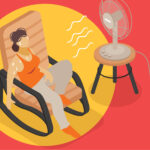Before engaging in physical activity, it’s crucial to stretch and warm up to prepare the muscles for exertion. This applies regardless of the type of sport you practice. However, in addition to stretching and warming up, recovery is essential.
Recovery is essential to restore muscle condition and enable further exercise in the following days. You need to massage your muscles, relax, and nourish them properly. Here are all our tips to promote recovery after your sports sessions.

Respect the recovery time
Recovery after exercise should occur in two stages. Firstly, you need to ensure active recovery, and secondly, you need to complement it with passive recovery.
Active recovery involves gradually reducing energy consumption during exercise and rebalancing blood circulation in the muscles. Thus, after each sports session, you should slow down or decrease the intensity of your movements. Think of tapering when decreasing your efforts and, above all, avoid abrupt stops. For example, when running, gradually slow down instead of stopping immediately after a fast run.
As for passive recovery, it involves resting completely to restore your energy reserves. This resting phase should occur within 72 hours after the session to ensure the metabolic window, the time when the body is more disposed to rest the muscles. Passive recovery can be achieved through a good night’s sleep or relaxing activities such as meditation. The key here is not to expend the restored reserves after the rest period.
Massage the muscles
Massaging or rubbing the muscles is necessary to reduce muscle tension and prevent soreness and discomfort after exercise. This action also helps to drain toxins accumulated during physical exertion, facilitate movements, and reduce muscle knots.
To do this, you should use a massage oil or a relaxing balm like Relax Tsara balm, formulated with essential oils. Note that massaging or rubbing the muscles with a balm before your sports sessions is also a way to prepare them for physical exertion. This optimizes blood circulation and makes them more flexible, although massaging the muscles does not replace warming up!
Consume carbohydrates
The consumption of carbohydrates also contributes to the recovery of energy in the muscles after intense physical effort. These macronutrients act by restoring glycogen reserves in the muscles.
If you want the action of carbohydrates to be optimal, you should consume them immediately after exercise. This boosts glycogen synthesis. Moreover, if you engage in endurance sports such as trail running, hiking, or marathons, it is better to take carbohydrates throughout the activity to anticipate recovery.
Stay well hydrated
You must ensure to hydrate properly before, during, and after physical activity. Exercise increases body temperature, and to continue moving without overheating, it is essential to prevent heat strokes. It is also useful to eliminate toxins secreted by the body and compensate for water and electrolyte losses caused by sweating. Hydration greatly contributes to this.
To recover well through hydration, you should drink water in small sips throughout physical activity and afterward. Ensure to consume about 500 ml of water per hour of effort to meet the body’s needs adequately.
It is also advisable to opt for mineral water if you engage in intense physical activity. It will provide the electrolytes you need to recover: sodium, bicarbonates, chloride, calcium, etc. Avoid drinking carbonated or excessively sugary beverages; however, you can also consume fruits and vegetables rich in water before and after exercise. These foods also provide vitamins, carbohydrates, and trace elements simultaneously.






